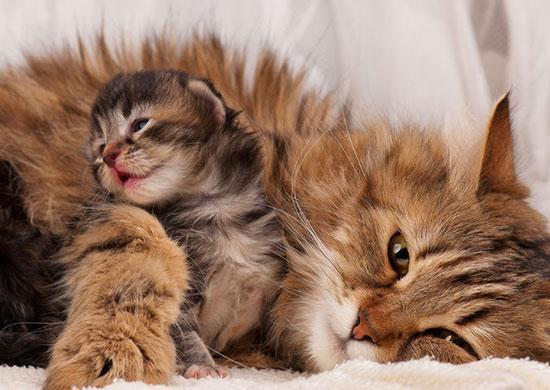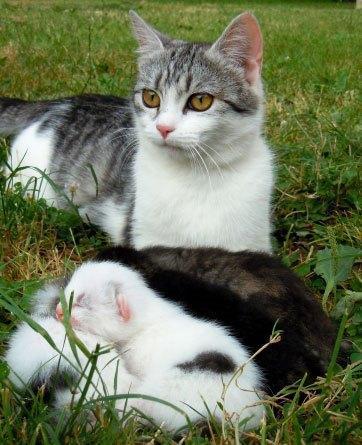This content is archived from the Feline Nutrition Foundation
Oh! Those Dirty Little Kittens!
- Updated: Saturday, June 01, 2019 03:03 PM
- Published: Thursday, February 25, 2010 09:20 AM
- Written by Margaret Gates
 You may have heard of the hygiene hypothesis. The theory is that exposure to dirt and germs early in life helps to prevent allergies later – your immune system needs to be "trained" at an early age to fight off allergens.¹ The idea came from the observation that children who grew up on farms had a much lower incidence of allergies than those in cleaner environments, without as much exposure to naturally-occurring germs. Some studies conclude that infants exposed to multiple pets, cats or dogs, have fewer allergies as adults.²
You may have heard of the hygiene hypothesis. The theory is that exposure to dirt and germs early in life helps to prevent allergies later – your immune system needs to be "trained" at an early age to fight off allergens.¹ The idea came from the observation that children who grew up on farms had a much lower incidence of allergies than those in cleaner environments, without as much exposure to naturally-occurring germs. Some studies conclude that infants exposed to multiple pets, cats or dogs, have fewer allergies as adults.²
Two additional studies add to this idea. One indicates it may apply to creatures other than humans. The hygiene hypothesis may go far beyond allergies. The first involved a study of residents of a Philippine city with lower levels of sanitation than those generally found in the west. Tests were done when residents reached age 20 to measure their blood for CRP, short for C-reactive protein, a marker for chronic inflammation. It found the more pathogens they were exposed to before age two, the less CRP they had at the age of 20. It appeared that every bout of diarrhea, every period of time living exposed to animal feces and being born in the dusty, dirty dry season cut their chances of having higher CRP levels.
 Perhaps, if you don't encounter many pathogens early on, your immune system ends up causing inflammation – a normal reaction to infection – at the wrong times. Chronic inflammation has been implicated in higher levels of heart disease, diabetes and mortality.³ While exposure to all of these pathogens is dangerous, it has the side effect of helping to train the immune system to function correctly.
Perhaps, if you don't encounter many pathogens early on, your immune system ends up causing inflammation – a normal reaction to infection – at the wrong times. Chronic inflammation has been implicated in higher levels of heart disease, diabetes and mortality.³ While exposure to all of these pathogens is dangerous, it has the side effect of helping to train the immune system to function correctly.
The second study involved tests with pigs. Piglets were raised in three different environments: outdoors, indoors and isolated. The isolated piglets were also fed antibiotics daily. More than 90 percent of the gut bacteria of the outdoor pigs were of a family known to limit pathogens such as salmonella and e. coli. This type of gut bacteria was less than 70 percent for the indoor piglets and about 50 percent for the isolated piglets. Those raised in isolation expressed more genes involved with inflammatory immune responses. The piglets raised outdoors expressed more genes involved with infection-fighting T-cells. This study noted there is evidence immune responses are linked to organisms in the gut – the "dirty" outdoor piglets had picked up friendly bacteria that helped them develop robust immune systems.
Maybe all creatures, not just people, need a certain amount of exposure to a natural, dirty environment when young to develop good immune systems that don't turn on them later in life.
I think about my cats. I know little about their early kittenhood, as they were all adopted from rescue organizations. A few were outdoors at least some of the time. A couple were strictly indoors from about two weeks of age. They had to be bottle-fed after their mother was hit and killed by a car. I think about that "clean" upbringing and whether their immune systems may have suffered for it. All in all, being outdoors in the area I live is probably too dangerous on the macro level, what with coyotes, fox, hawks, stray dogs and cars. It's too dangerous to explore the possible benefit they would get on the micro level, but I will keep an eye on them as they get older.
Additional Reading
Answers: Raw Cat Food for All of Those Kittens!
A Cat's Food Allergies and Intolerances Explained
Perhaps someday a pathogen "cocktail" will be developed to train immune systems without endangering the infant animal, whether human or feline. In the meantime, letting your toddler make mud cakes in the backyard might be a good idea. Perhaps you should let kittens help out in the dirt, under protected supervision of course, so the macro baddies don't get them.
Margaret Gates is the founder of the Feline Nutrition Foundation.
1. H. Garn and H. Renz, "Epidemiological and Immunological Evidence for the Hygiene Hypothesis," Immunobiology212, no. 6, April 30, 2007, 441-52.
2. Dennis R. Ownby, MD, "Multiple Pets May Decrease Children's Allergy Risk," Journal of the American Medical Association, August 28, 2002.
3. J. Danesh, P. Whincup, M. Walker, L. Lennon, A. Thomson, P. Appleby, J. R. Gallimore, and M. B. Pepys, "Low Grade Inflammation and Coronary Heart Disease: Prospective Study and Updated Meta-Analyses, " British Medical Journal 321, 2000, 199-204.
A. D. Pradhan, J. E. Manson, N. Rifai, J. E. Buring, and P. M. Ridker, "C-reactive Protein, Interleukin 6, and Risk of Developing Type 2 Diabetes Mellitus," Journal of the American Medical Association 286, 2001, 327-349.
H. K. Kuo, J. F. Bean, C. J. Yen, and S. G. Leveille, "Linking C-Reactive Protein to Late-life Disability in the National Health and Nutrition Examination Survey (NHANES) 1999-2002," Journal of Gerontology 61, December 7, 2005, 380-87.




